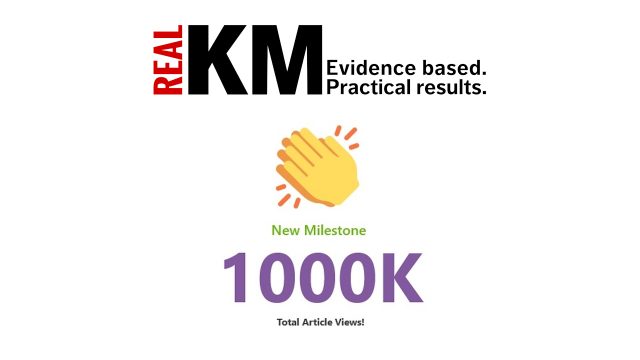
What can KM4Dev and RealKM do to assist the decolonisation of knowledge and KM?
This article provides notes and links to accompany my part of KM4Dev Knowledge Cafè 16: Decolonisation of knowledge action plan on 20 May 2021.
Suggestions in regard to what KM4Dev and RealKM can consider doing to assist the decolonisation of knowledge and knowledge management (KM) are made across four areas. Included are suggestions that are relevant to both KM4Dev and RealKM’s own activities and the role that they can play in promoting and supporting decolonisation in the broader global KM community.
The four areas are:
- Decolonising KM research
- Decolonising KM discussions
- Decolonising KM practice
- Narrative disruption.
1. Decolonising KM research
Euro-American geographic bias
A 2018 study1 found a serious imbalance in global KM research. Two-thirds of KM research papers have been produced in the United States, the United Kingdom, and Europe. By stark comparison, there are very few KM research papers from much of Africa, South America, Central America, the Middle East, Central Asia, South-East Asia, and Russia.
English language bias
In the #75 article4 in Altmetric’s top 100 list for 2020, Valeria Ramírez-Castañeda explores how Colombian researchers in biological sciences are disadvantaged in publishing their work in academic journals by the dominance of the English language in science. She states that although having a common language is important for science communication, generating multilingual alternatives in global academic publishing would promote diversity.
2. Decolonising KM discussions
As with KM research, geographic and language biases exist in KM discussion forums, but it needs to be acknowledged that it is very challenging for voluntary or small not-for-profit organisations to implement multilingual alternatives (and indeed, RealKM Magazine has geographic and language biases because of these challenges). However, there are some initial steps that can be potentially taken.
A further issue is the potential for people with long-term KM experience in the Global North to talk over or talk down to people with lived experience in the Global South.
3. Decolonising KM practice
Recognising different KM approaches
Aligned with the geographic biases in KM research mentioned above, what we know as KM originated in a relatively small part of the world7 with generally uniform culture and values. While much of the rest of the world may not have practiced KM as such, it has been successfully managing knowledge for a very long time, and has learnt much in the process. Given this, it would be very wrong to assume that what we know as KM constitutes all there is to know about managing knowledge, or has even found the best ways of doing it.
Technoscientific and technocratic approaches in development
In a recent paper10, Maru Mormina and Romina Istratii write that in regard to international development, “the technoscientific paradigm serves a universalising, deterministic, teleological, western, and inevitably westernising, narrative of development that downgrades other forms of knowledge.”
Similarly, another recent paper11 states that “Narrow and technocratic understandings of accountability [in international development] can inadvertently depoliticise the humanitarian space and undermine community self-advocacy efforts and local visions for change … The paper advocates for humanitarian accountability as a site of potentiality and innovation. It argues that innovation through accountability can be achieved by an active engagement of recipient communities based on principles of deep listening and action.”
4. Narrative disruption
In a recent book chapter12, Thomas Hervé Mboa Nkoudo advocates for “cognitive decolonisation” as a starting point in decolonisation, stating that “I can guarantee that those experiencing only the Western reality, where academic conditions are optimal, will not be aware of the realities and barriers faced by African universities and researchers. That is why it is so important to decolonize the way of thinking of scholars from the North.”
This lack of awareness by those in the Global North of realities in the Global South gives rise to and sustains cognitive biases and biased narratives not just in academia, but in all aspects of society.
As David Gurteen advises in a recent article on societal KM, “As individuals, we know almost nothing compared to what we think we know. Our personal knowledge is more than just an illusion. It is a delusion. If we thought deeply for one moment, we would realize we are ignorant of our ignorance.”
This knowledge delusion provides the foundation for the existence and persistence of the coloniality of knowledge, which is why Thomas Hervé Mboa Nkoudo contends that “cognitive decolonisation” is a necessary first step in the decolonisation of knowledge.
References:
- Wang, P., Zhu, F. W., Song, H. Y., Hou, J. H., & Zhang, J. L. (2018). Visualizing the Academic Discipline of Knowledge Management. Sustainability, 10(3), 682. ↩
- Maart, R. (ed) (2020). Decoloniality and Decolonial Education: South Africa and the World. Alternation, Special Edition 33. ↩
- Serenko, A., & Bontis, N. (2017). Global ranking of knowledge management and intellectual capital academic journals: 2017 update. Journal of Knowledge Management, 21(3), 675-692. ↩
- Ramírez-Castañeda, V. (2020). Disadvantages in preparing and publishing scientific papers caused by the dominance of the English language in science: The case of Colombian researchers in biological sciences. PloS one, 15(9), e0238372. ↩
- Serenko, A., & Bontis, N. (2017). Global ranking of knowledge management and intellectual capital academic journals: 2017 update. Journal of Knowledge Management, 21(3), 675-692. ↩
- Gayde, R. et al. (2020). Lived Experience Framework, Principles and practices for Lived Experience partnerships. WACOSS. ↩
- Wang, P., Zhu, F. W., Song, H. Y., Hou, J. H., & Zhang, J. L. (2018). Visualizing the Academic Discipline of Knowledge Management. Sustainability, 10(3), 682. ↩
- Boyes, B. (2018). Educating knowledge managers. Information Professional, March 2018. ↩
- Ortiz, J., Ren, H., Li, K., and Zhang, A. (2019). Construction of Open Innovation Ecology on the Internet: A Case Study of Xiaomi (China) Using Institutional Logic. Sustainability 11(11): 3225. ↩
- Mormina, M., & Istratii, R. (2021). ‘Capacity for what? Capacity for whom?’A decolonial deconstruction of Research Capacity Development practices in the Global South and a proposal for a value-centred approach. ↩
- Aijazi, O. (2021). Why technocratic understandings of humanitarian accountability undermine local communities. Development in Practice, 1-13. ↩
- Nkoudou, T.H.M. (2020). Epistemic Alienation in African Scholarly Communications: Open Access as a Pharmakon. In Eve, M. P., & Gray, J. (Eds.) Reassembling scholarly communications: Histories, infrastructures, and global politics of Open Access. MIT Press. ↩
- Cummings, S., De Haan, L., & Seferiadis, A. A. (2020). How to use critical discourse analysis for policy analysis: a guideline for policymakers and other professionals. Knowledge Management for Development Journal. ↩
- Botticello, J. (2020). Engaging Many Voices for Inclusivity in Higher Education. Journal of Impact Cultures, 1(1), 22-38. ↩
- Moreno-Cely., A., Cuajera-Nahui., D., Escobar-Vasquez., C., Vanwing., T. and Tapia-Ponce., N. (2021). Breaking monologues in collaborative research: Bridging knowledge systems through a listening-based dialogue of wisdom approach. Sustainability Science, 16: 919–931. ↩


![Collaborating on Research by National Eye Institute [Flickr image]](jpg/9955278615_c5356cdffd_z.jpg)


